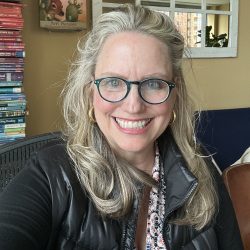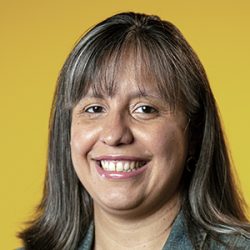Contact Us
-
Graduate Admissions212-875-4404
-
Program Director, Bilingual/Dual Language, TESOL, and Childhood Special Education Programs
Childhood Special Education (On Campus or Online)
MSEd, EdM
-
Program Overview
The Childhood Special Education program prepares students to be model teachers in specialized settings.
This program is for teachers and prospective teachers like yourself, wishing to work with children with variations in grades 1 through 6. In this program, you have the opportunity to work in a range of special education settings. This includes children from diverse racial, ethnic, socioeconomic, and linguistic backgrounds. You will think specifically about designing accessible curricula and differentiated experiences for children with a variety of social, emotional, behavioral, physical, and cognitive variations. You will:
- Construct developmentally responsive learning experiences that encourage all learners to follow their curiosities.
- Create accessible curricula so all learners can explore literacy, literature, mathematics, science, arts, and social studies content.
- Develop a strong social justice focus in order to advocate for and with children and families.
- Plan for dynamic and collaborative partnerships with families and school professionals.
- Engage in critical explorations of yourself, others, and the wider world.
This program culminates in a Master of Science in Education or a Master of Education (for those students with a prior master’s degree in education), and requires 36 credits. This program is offered either on campus or fully online.
Due to the cohort nature of this program, students are not permitted to transfer into the online program once they have begun coursework in an on campus program.
-
Admissions & Tuition
In addition to the main admissions criteria, there are additional requirements needed to apply for this program:
- Applicants must already hold a valid New York State certification in General Education at the Early Childhood or Childhood level. If you are certified at the Early Childhood level, there may be additional Childhood tests you need to take to become certified in working with Students with Disabilities (1st-6th grade).
This program has an on-campus and a fully online option. For both tracks, you will engage in the use of technology. Particularly for the fully online program, you will be asked to use a range of technological tools. You must have a dedicated computer or tablet and stable Internet access. You will be expected to become familiar with the online tools, reach out to ask for support as you navigate the technology, and strengthen your presence and skill set in the online environment.
-
Curriculum & Courses
-
Supervised Fieldwork
Our unique supervised fieldwork program is designed to support your integration of theory and practice. You will:
- Be supervised by your advisor, a core graduate faculty mentor and experienced teacher.
- Participate in a weekly conference group of 5-7 students and your advisor.
- Reflect on a lesson with your advisor once each month.
- Meet individually with your advisor once each month.
- Complete projects to help you take a deeper look at the setting and students you work with.
You will work in a classroom setting as a full-time head teacher or assistant, or as a student teacher (3 days each week):
- As a student teacher you will be placed in one special education setting within grades 1-6.
- As a working head or assistant teacher you will use your own classroom as your fieldwork.
New York State requires all graduate students in this program to have a supervised fieldwork experience in a special education or inclusion setting. Student teachers fulfill this experience through their placement in the fall or spring. Working teachers and assistants may need to enroll in an additional fieldwork placement, where they will be placed by Bank Street in the appropriate setting to fulfill their degree requirements.
-
Certification & Careers
Childhood Special Education graduates go on to:
- Teach in special education or inclusion classrooms in public, charter or independent schools.
- Tutor or work as a learning specialist in schools or in private practice.
- Work in special education teacher support services (SETSS) roles.
-
Faculty
 Pamela JonesSupervised Fieldwork Advisor & Course Instructorpjones@bankstreet.edu 212-875-4660
Pamela JonesSupervised Fieldwork Advisor & Course Instructorpjones@bankstreet.edu 212-875-4660 Nesta MarshallSupervised Fieldwork Advisor & Course Instructornmarshall@bankstreet.edu 212-875-4559
Nesta MarshallSupervised Fieldwork Advisor & Course Instructornmarshall@bankstreet.edu 212-875-4559 Sean O’SheaSupervised Fieldwork Advisor & Course Instructorsoshea@bankstreet.edu 212-875-4486
Sean O’SheaSupervised Fieldwork Advisor & Course Instructorsoshea@bankstreet.edu 212-875-4486 Susie RolanderContent Specialist, Supervised Fieldwork Advisor, Course Instructorsrolander@bankstreet.edu 917-751-3415
Susie RolanderContent Specialist, Supervised Fieldwork Advisor, Course Instructorsrolander@bankstreet.edu 917-751-3415 Elizabeth Silva DiazProgram Director, Bilingual/Dual Language, TESOL, and Childhood Special Education Programsesilva@bankstreet.edu
Elizabeth Silva DiazProgram Director, Bilingual/Dual Language, TESOL, and Childhood Special Education Programsesilva@bankstreet.edu -
Certification
When you complete the Childhood Special Education program you will be eligible for your:
- Initial certification Teaching Students with Disabilities, grades 1-6: for those who meet experience requirements and pass state assessments.
After teaching for three years you will be eligible for professional certification.
*Federal regulation, 34 CFR 668.14(b)(32) requires all online educational programs leading to licensure, including all teacher and leader certification programs, only enroll students who plan to work in the state where their program leads to certification or in a state where there is reciprocity. Compliance with these regulations is essential for all educational institutions to continue to receive Federal financial assistance and to operate educational programs. Bank Street issues certification in New York State (NYS). If you are not a NYS resident, during the application process you will let us know if you plan to work in NYS or in one of the states where NYS has reciprocity upon completion of your graduate program. Whether or not you plan to work in NYS or a state with reciprocity, you must complete this attestation during the application process. If you have any questions about certification, please reach out to certification@bankstreet.edu.
Childhood Special Education curriculum meets the educational requirements for professional licensure or certification in following states: CO, CT, DE, HI, IA, ID, MA, MD, MI, MN, MO, MS, ND, NY, OK, OR, RI, SD, TN, WI, WV, WY

The Bank Street Experience
GSE alum, Jared Slater ’16, talks about the Bank Street experience.
-
TranscriptTranscript Prompt: What drew you to Bank Street? Jared: It was really a fluke that I found out about Bank Street. Somebody mentioned, er, I was applying, they said, you should look at Bank Street. Went to the website. And when I started reading about I was like, this is very different from everything else I had looked at. And when I moved into the application process, that process was extremely different. How much writing is required just to apply to the program and how much reflection you have to do before you’re even a student there, was very appealing to me. And it was so different than the other institutions, I was like, this… is something special. Prompt: Can you talk about a big takeaway from your coursework at Bank Street? Jared: One of the biggest impacts was looking at the structures in place instead of looking at kids when there’s some sort of issue. Like when a kid is struggling, instead of looking at the kid and saying well the kid is the problem, I think the work that Bank Street has taught me to look at is, well, what am I doing as a teacher and was is the structures of the classroom doing that are making things hard for the kid. So you can look at those and change those instead of trying to change the kid. Prompt: What words best describe Bank Street? Jared: Inspirational. Empowering. And I think I’m required to say reflective, because if I don’t say reflective they take my degree back. (laughs) Prompt: What advice do you have for new teachers? Jared: When a lesson doesn’t go as planned, I’ve heard other teachers put that fault on the kids. And I know from my experience at Bank Street, it’s not the kids’ fault, it’s my fault. So I have to reflect and say, what did I do that I could have done better, why weren’t the kids engaged? It’s not the kids’ fault, it’s something that I have to think about my work.